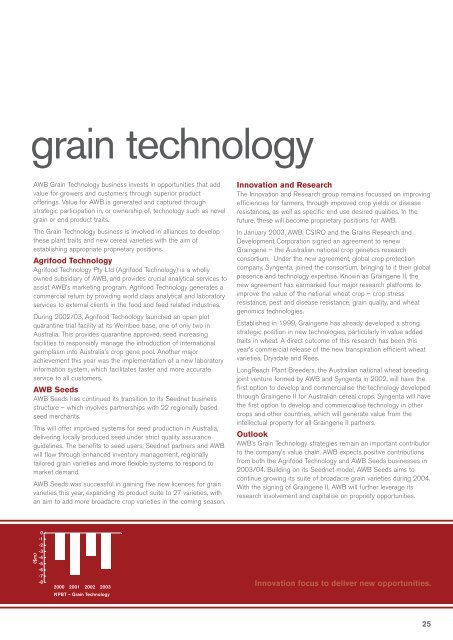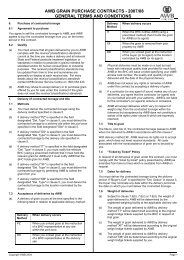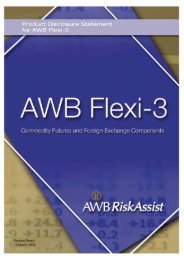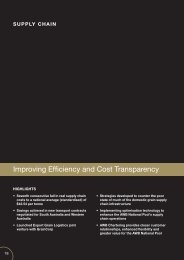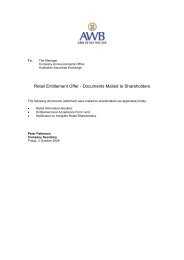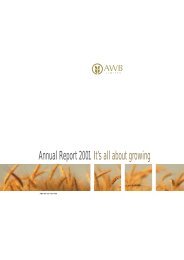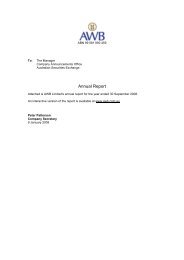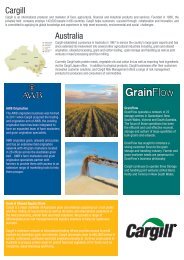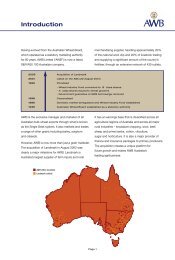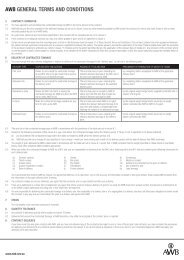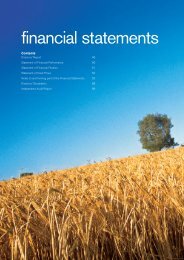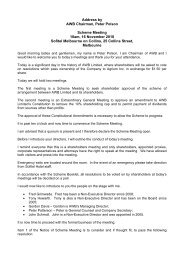AWB Limited - 2003 Annual Report
AWB Limited - 2003 Annual Report
AWB Limited - 2003 Annual Report
You also want an ePaper? Increase the reach of your titles
YUMPU automatically turns print PDFs into web optimized ePapers that Google loves.
grain technology<br />
<strong>AWB</strong> Grain Technology business invests in opportunities that add<br />
value for growers and customers through superior product<br />
offerings. Value for <strong>AWB</strong> is generated and captured through<br />
strategic participation in, or ownership of, technology such as novel<br />
grain or end product traits.<br />
The Grain Technology business is involved in alliances to develop<br />
these plant traits and new cereal varieties with the aim of<br />
establishing appropriate proprietary positions.<br />
Agrifood Technology<br />
Agrifood Technology Pty Ltd (Agrifood Technology) is a wholly<br />
owned subsidiary of <strong>AWB</strong>, and provides crucial analytical services to<br />
assist <strong>AWB</strong>’s marketing program. Agrifood Technology generates a<br />
commercial return by providing world class analytical and laboratory<br />
services to external clients in the food and feed related industries.<br />
During 2002/03, Agrifood Technology launched an open plot<br />
quarantine trial facility at its Werribee base, one of only two in<br />
Australia. This provides quarantine approved, seed increasing<br />
facilities to responsibly manage the introduction of international<br />
germplasm into Australia’s crop gene pool. Another major<br />
achievement this year was the implementation of a new laboratory<br />
information system, which facilitates faster and more accurate<br />
service to all customers.<br />
<strong>AWB</strong> Seeds<br />
<strong>AWB</strong> Seeds has continued its transition to its Seednet business<br />
structure – which involves partnerships with 22 regionally based<br />
seed merchants.<br />
This will offer improved systems for seed production in Australia,<br />
delivering locally produced seed under strict quality assurance<br />
guidelines. The benefits to seed users, Seednet partners and <strong>AWB</strong><br />
will flow through enhanced inventory management, regionally<br />
tailored grain varieties and more flexible systems to respond to<br />
market demand.<br />
<strong>AWB</strong> Seeds was successful in gaining five new licences for grain<br />
varieties this year, expanding its product suite to 27 varieties, with<br />
an aim to add more broadacre crop varieties in the coming season.<br />
Innovation and Research<br />
The Innovation and Research group remains focussed on improving<br />
efficiencies for farmers, through improved crop yields or disease<br />
resistances, as well as specific end use desired qualities. In the<br />
future, these will become proprietary positions for <strong>AWB</strong>.<br />
In January <strong>2003</strong>, <strong>AWB</strong>, CSIRO and the Grains Research and<br />
Development Corporation signed an agreement to renew<br />
Graingene – the Australian national crop genetics research<br />
consortium. Under the new agreement, global crop protection<br />
company, Syngenta, joined the consortium, bringing to it their global<br />
presence and technology expertise. Known as Graingene II, the<br />
new agreement has earmarked four major research platforms to<br />
improve the value of the national wheat crop – crop stress<br />
resistance, pest and disease resistance, grain quality, and wheat<br />
genomics technologies.<br />
Established in 1999, Graingene has already developed a strong<br />
strategic position in new technologies, particularly in value added<br />
traits in wheat. A direct outcome of this research has been this<br />
year’s commercial release of the new transpiration efficient wheat<br />
varieties, Drysdale and Rees.<br />
LongReach Plant Breeders, the Australian national wheat breeding<br />
joint venture formed by <strong>AWB</strong> and Syngenta in 2002, will have the<br />
first option to develop and commercialise the technology developed<br />
through Graingene II for Australian cereal crops. Syngenta will have<br />
the first option to develop and commercialise technology in other<br />
crops and other countries, which will generate value from the<br />
intellectual property for all Graingene II partners.<br />
Outlook<br />
<strong>AWB</strong>’s Grain Technology strategies remain an important contributor<br />
to the company’s value chain. <strong>AWB</strong> expects positive contributions<br />
from both the Agrifood Technology and <strong>AWB</strong> Seeds businesses in<br />
<strong>2003</strong>/04. Building on its Seednet model, <strong>AWB</strong> Seeds aims to<br />
continue growing its suite of broadacre grain varieties during 2004.<br />
With the signing of Graingene II, <strong>AWB</strong> will further leverage its<br />
research involvement and capitalise on propriety opportunities.<br />
($m)<br />
0<br />
-1<br />
-2<br />
-3<br />
-4<br />
-5<br />
-6<br />
-7<br />
-8<br />
INNOVATION Innovation FOCUS TO focus DELIVER to deliver NEW new OPPORTUNITIES<br />
opportunities.<br />
2000 2001 2002 <strong>2003</strong><br />
NPBT – Grain Technology<br />
25


